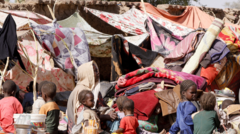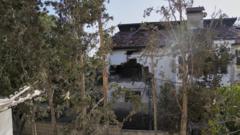Amid a deteriorating situation, anti-Hamas protests are on the rise in Gaza, with more citizens openly challenging the group's authority and demanding change, highlighting the complexities of life under their rule.**
Rising Dissatisfaction: Palestinians in Gaza Challenge Hamas Amid Intensified Protests**

Rising Dissatisfaction: Palestinians in Gaza Challenge Hamas Amid Intensified Protests**
As the humanitarian crisis deepens, public dissent against Hamas is emerging with unprecedented boldness in Gaza, despite the risks involved.**
Public dissent in Gaza, previously suppressed by Hamas, has seen a notable increase as citizens express frustration over the group’s governance during an ongoing humanitarian crisis. Videos circulating on social media display protesters chanting slogans such as "Out! Out! Out!" and "Hamas is garbage," demonstrating the shift in public sentiment.
For nearly two decades, Hamas has had an unyielding grip over Gaza, but recent protests indicate a growing dissatisfaction among the populace, many of whom blame the group for the dire conditions they face. Moumen al-Natour, a lawyer and former organizer of a past anti-Hamas initiative, voiced the urgency of raising their voices against the ruling body, stating, “We didn’t choose Hamas, and now Hamas is determined to rule Gaza and tie our fate to its own.”
Speaking candidly, Moumen's challenge to speak out is fraught with risk, as dissent has historically been met with severe repercussions from Hamas. Tragically, the killing of 22-year-old Oday al-Rubai—a participant in recent protests—highlighted the potential consequences of opposing the regime, as his family accused Hamas of involvement in his abduction and subsequent torture.
Despite the climate of fear, the protests continue to grow. Eyewitnesses have reported instances where residents collectively defended their neighborhoods from Hamas’ attempts to carry out military operations, underscoring a newfound boldness in resisting the group’s authority.
Amin Abed, a long-time critical voice against Hamas who now resides in Dubai, noted a perceptible decline in the group’s hold on power, suggesting that their previous methods of intimidation are less effective than they once were. “Hamas targets activists and civilians, but it’s not how it was before,” he observed.
Recent incidents confirm this, with protesters actively preventing militants from using civilian spaces for military purposes, despite facing violent reprisals. The call for distancing Hamas from critical infrastructures, such as hospitals and schools, also reflects a growing desire among citizens for autonomy from the dire consequences of armed conflict.
While these protests have yet to coalesce into a unified rebellion against the group, they indicate a significant transformation in the public’s willingness to confront authority, revealing a population that, having endured years of conflict, is beginning to prioritize their demands for a better future.
As Gazans navigate this complex landscape, they remain caught between external aggression and internal repression, facing their struggles against both Hamas and Israeli military actions. The shift in sentiment raises questions about the future of governance in Gaza and the prospects of achieving significant change in a region long plagued by conflict.


















